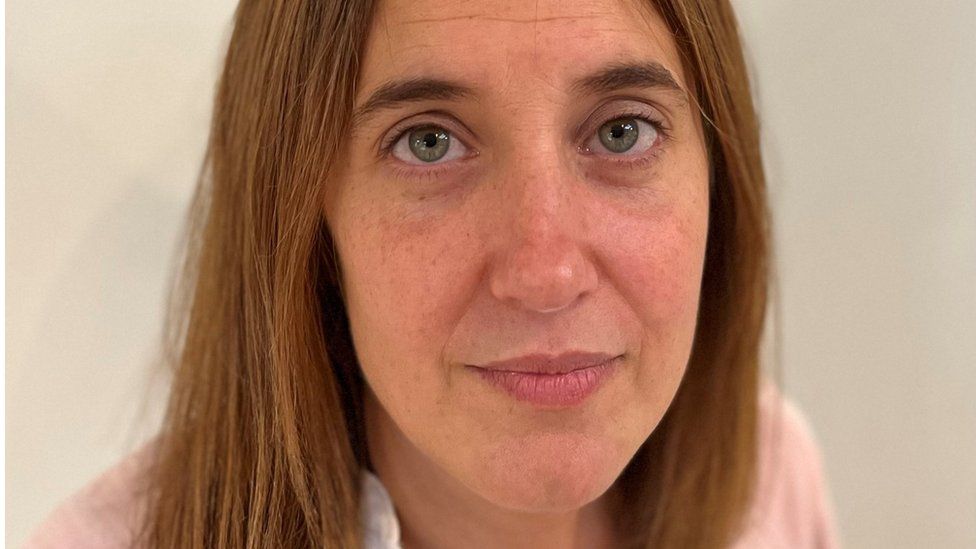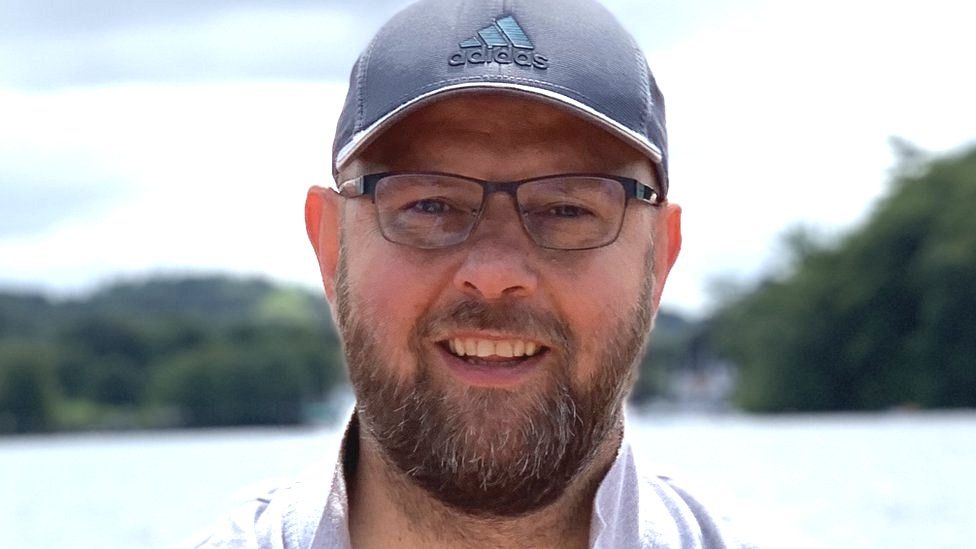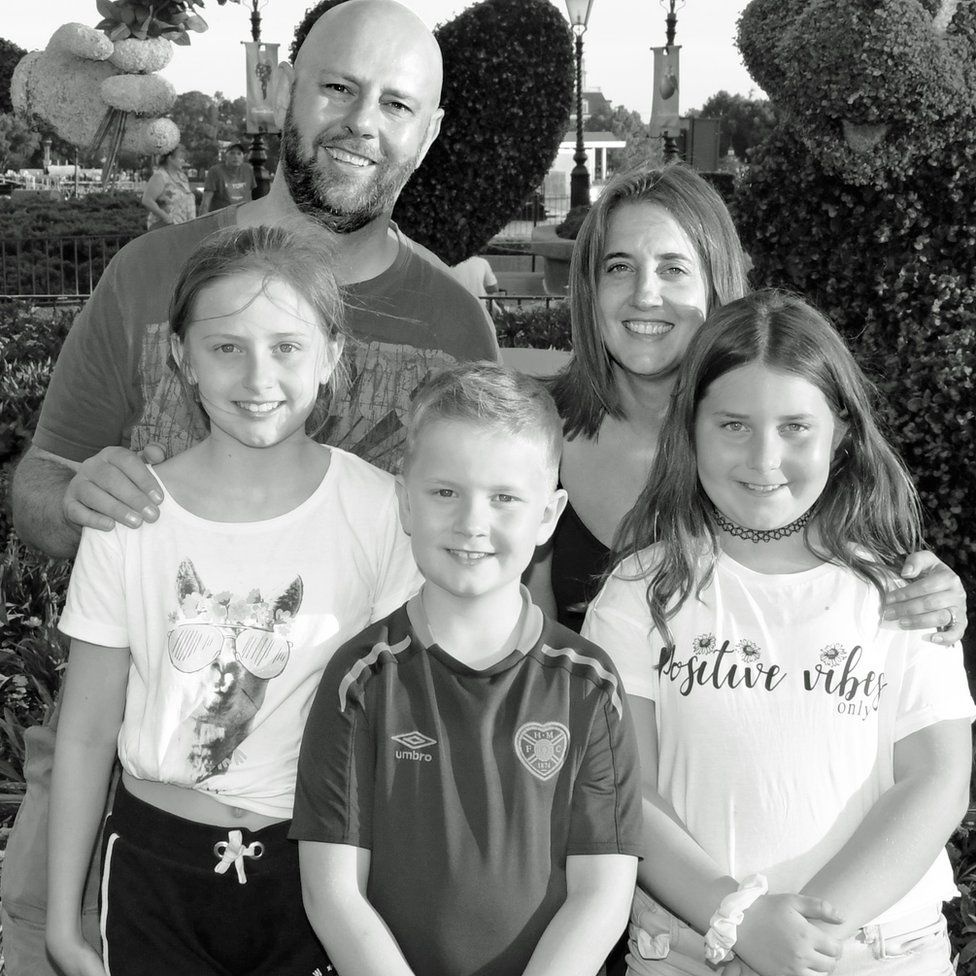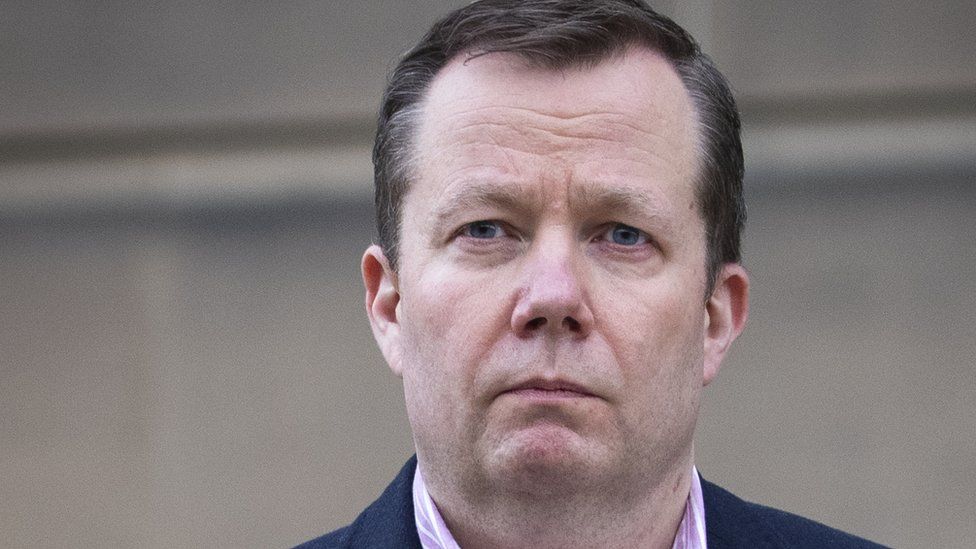Top civil servant Andrew Slorance was treated for an undisclosed infection at a troubled hospital.

The widow of a top Scottish government official, who died after contracting Covid, believes the full details of his illness were concealed to protect the reputation of a troubled hospital.
Andrew Slorance went into Glasgow’s Queen Elizabeth University Hospital for cancer treatment a year ago.
His wife Louise believes he caught Covid there as well as another life-threatening infection.
The health board said it had been “open and honest”.
It said there had been no attempt to conceal any information from the family.
Mr Slorance was head of the Scottish government’s response and communication unit, which was responsible for its handling of the Covid pandemic.
When he died First Minister Nicola Sturgeon led tributes, saying the government was devastated.
She described the father-of-five from Edinburgh as a “wonderful person” who made a difference in all he did.
The 49-year-old official went in to the £850m flagship Queen Elizabeth University Hospital (QEUH) at the end of October 2020 for a stem cell transplant and chemotherapy as part of treatment for Mantle Cell Lymphoma (MCL).
He died nearly six weeks into his stay, with the cause of his death listed as Covid pneumonia.
But after requesting a copy of his medical notes, Mrs Slorance discovered her husband had also been treated for an infection caused by a fungus called aspergillus, which had not been discussed with either of them during his hospital stay.

The infection is common in the environment but can be extremely dangerous for people with weak immune systems.
Mrs Slorance questions whether it may have played a part in her husband’s death, and if so, why she was not told?
She told the BBC: “I think somebody and probably a number of people have made an active decision not to inform his family of that infection, either during his admission or post-death.”
Mrs Slorance believes that officials wanted to protect the hospital, which is already the subject of a public inquiry, and its reputation, “no matter what the cost”.
She said: “The impact of the health board hiding the fungal infection will have lifelong impacts on all members of our family, including five children.
“The reason? To protect a building, a health board and political decision-making.”
Mrs Slorance says a full investigation should take place into incidences of aspergillus at the hospital campus.
In response, NHS Greater Glasgow and Clyde said: “We are sorry that the family are unhappy with aspects of Mr Slorance’s treatment, details of which were discussed with the family at the time.
“While we cannot comment on individual patients, we do not recognise the claims being made.
“We are confident that the appropriate care was provided. There has been a clinical review of this case and we would like to reassure the family that we have been open and honest and there has been no attempt to conceal any information from them.”
First Minister Nicola Sturgeon paid tribute to Mr Slorance in the Scottish Parliament, describing him as a “greatly valued member of the Scottish government team” who she said was “greatly missed by everyone who had the privilege of working with him, and that includes me”.
She pledged to ensure his family would get the answers they are seeking, adding: “I will not and this government will not tolerate cover-ups or secrecy on the part of any health board and where there are concerns about that we will address those concerns.”
But Scottish Labour leader Anas Sarwar said the case was the latest in a series of scandals to have hit the hospital.
He added: “This is the worst scandal of the devolution era and in any other country in the world there would be resignations and sackings, but under this government it is denial and cover-up.”

The health board offered to meet Mr Slorance’s family to discuss the care provided and the issues they have raised.
Mr Slorance was first treated for Mantle Cell Lymphoma (MCL) in 2015, but suffered a relapse in 2019.
A second stem cell transplant was delayed when the pandemic hit in March last year but he was finally admitted to the haematology ward at the QEUH on the 26 October 2020, after a negative Covid test.
Despite being treated in an isolation room during this time, he tested positive eight days later on 3 November, and he was moved for his Covid treatment – eventually to intensive care.
His wife, who was at home with his three younger children, said that as Mr Slorance’s condition deteriorated, she struggled to get information about what was happening.


Aspergillus is a common fungus, its spores are found in the air all around us. For most people it will be harmless but it can cause serious infection in people who have weak immune systems.
Experts say it is very difficult to confirm a diagnosis as the body can incubate it for some time, and high-risk patients are often treated for it as a precaution as they are particularly vulnerable to infections.
Andrew Slorance should have been shielded from bugs like this by special air filters as he underwent his transplant, but after testing positive for Covid he had to be moved for additional care, eventually to intensive care.
His cancer treatment was always going to be complex, but being exposed to other risks may have put him at greater danger.
His widow’s anger comes from feeling she wasn’t told the whole story. And that anger is directed to a health board which has previously been criticised for poor communication with families.

Mrs Slorance said: “On the phone I thought he sounded alright even as treatment was escalating.
“Then he went silent and wasn’t speaking to any of us on the phone. I think I felt deep down that he was pushing us away to prepare us for the worst.
“But he came back to me eventually and said it was too hard to speak with the masks and everything else.
“But he actually spoke, and that was the last five-minute call with the kids before ventilation.”
Mr Slorance was moved to ICU on 20 November of last year and died at 11:36 on 5 December.
His wife believes that he contracted Covid in the hospital when he should have been protected by strict infection control measures as his immune system was weakened by chemotherapy.

Image source, PA Media
Mrs Slorance tried to piece together how he could have contracted the virus.
She spoke on the phone to her husband’s former colleague, the Scottish government’s National Clinical Director Jason Leitch, and said the exchange left her “explosively angry”.
“I had a conversation with Jason Leitch where he suggested that Andrew could be in a different situation and therefore could have been incubating the Covid longer, and that the family could have been the source,” she said.
Mrs Slorance said it felt like the blame was being put on the family.
“And yet everybody had spent seven months doing everything they possibly could to protect Andrew and keep him safe, and that impacted every aspect of our lives,” she said.
In response, Prof Leitch issued a statement saying he was trying to provide support to a long-standing colleague and was in no way seeking to apportion responsibility for Mr Slorance’s Covid infection to any particular person or group.
He apologised sincerely for any distress that had been caused.
Prof Leitch said: “Andrew Slorance was an outstanding public servant and he was pivotal in much of the work the Scottish government undertook in the early response to the pandemic.
“His loss is felt profoundly in the Scottish government, but this will only be a fraction of the loss that is being experienced by his family.”
Mrs Slorance said the discovery that she had not been told the full details had “put her grief in suspension”.
“I don’t know what death I’m grieving,” she said.
“It’s not the one that you partially prepare for at the beginning of a treatment like this; it’s not the one I was told about, the Covid.
“I’ll never know if it was the aspergillus or the Covid, so I can’t grieve a death I don’t understand fully.”